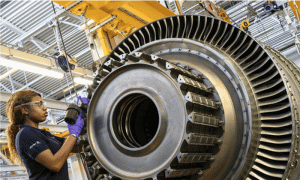 © AMETEK
© AMETEK
An interview with Barbara Snowden, Quality Assurance Technician at AMETEK Specialty Metal Products (SMP)
In this interview, we asked Barbara about her role as Quality Assurance Technician at AMETEK SMP and how women of all ages can be encouraged to consider engineering as a career of their choice.
Q. Tell us about your role as Quality Technician at AMETEK SMP?
I have worked at our precision metal strip facility in Wallingford for about three years now. My daily jobs include performing tests on incoming raw materials as well as our finished metal products. At this manufacturing site, we custom engineer advanced metal materials in countless alloys. These specialty products range from precision metal strip, shaped wire to shaped components and thermal management materials for super critical applications. The work is very varied and demanding, but also highly satisfying.
My role involves performing quality tests at specific stages in each material’s production process. This includes the final inspection and certification of materials. This means testing for required properties such as dimensions and performance, as well as mechanical, electrical, and chemical analysis.
Q. How do these tests work and what equipment do you use?
We use a variety of methods to ensure our products pass stringent quality standards. For example, for the chemical analysis, I digest powders and strip samples in acid. The process is simple, I weigh 1 gram of sample whether it be strip, powder or sintered, and digest it in acid. I cut strip samples into small pieces to aid in the digestion process. Some metals take longer to digest than others which extends the process.
I then analyze them using an ICP (Inductively Coupled Plasma) spectroscopy, XRF (X-Ray Fluorescence), or both, to determine their chemical composition by calculating the weight percent. Each test takes a short time to run, but the sample preparation can be much more time consuming, depending on the materials that are being analyzed.
Q. What is a typical day for you, and what’s the best part of it?
A typical day for me is always dictated by the production schedule. Whatever the team is working on in Production is what I will be handling and testing further down the line. I work in concert with the Production team to ensure that all our materials meet internal and external quality specifications.
The best bit of my day is getting to conduct the quality tests. Whether it is the chemical analysis, or whether I am in the Finishing Lab doing tensile testing or releasing a certified product, it always gives me great pride to know that what I do ensures that AMETEK SMP is manufacturing the highest quality products possible. And I have to say that our products routinely exceed our customers’ expectations as a result.
Q. Have you always been interested in engineering?
I don’t think that I ever specifically planned to work in engineering, but my interests and skills have led me naturally into this sector, where I am very happy to be. Prior to joining AMETEK SMP, I worked in the petroleum industry, where I was involved in testing all kinds of fuels and lubricants. I have always been committed to the quality angle of manufacturing and engineering, which is why I have also recently worked for and gained my Six Sigma Black Belt.
Six Sigma is a disciplined, data-driven approach for eliminating defects from any process. The fundamental objective is the implementation of a measurement-based strategy that focuses on process improvement and variation reduction. Our team takes learnings from this methodology and continually strives to improve our processes to ensure the highest quality product.
Q. How do you think we can encourage more women to work in an engineering company – to apply for an engineering job in the first place?
The idea of profiling women and promoting their successes in the industry is a very good one, because it allows other women to envisage themselves in a similar role. Another good method is to partner with academic institutions, sponsor engineering contests and show women how to benefit from mentorship programs, internships, and other opportunities to get a foot in the door.
In my opinion, encouraging young women to consider a career in engineering should start at elementary school level and continue right through to college. I believe that familiarity and understanding of the broader field of engineering makes it easier for women of all ages to relate to it and become interested in working in it themselves
Q. Finally, what advice would you give young women who are leaving school or college and wondering how to break into the engineering world?
I would advise someone who is curious about our sector to take a class that would give them some good insights into what engineering offers and involves. Or take a summer job that gives them some hands-on experience on the job. Seek out a mentor in the field that you want to join. Plus, you can always do lots of research – there’s tons of videos on the internet now that go through what people involved in engineering do every day. Get out there and explore the opportunities open to you!












